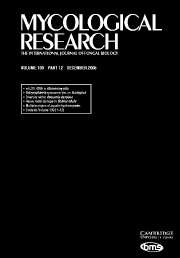Crossref Citations
This article has been cited by the following publications. This list is generated based on data provided by
Crossref.
Frazer, Lilyann Novak
1998.
One stop mycology.
Mycological Research,
Vol. 102,
Issue. 12,
p.
1571.
Burges, H. Denis
1998.
Formulation of Microbial Biopesticides.
p.
131.
Brooks, Alexandra J
de Muro, M Aquino
Burree, E
Moore, D
Taylor, MA
and
Wall, R
2004.
Growth and pathogenicity of isolates of the fungus Metarhizium anisopliae against the parasitic mite, Psoroptes ovis: effects of temperature and formulation.
Pest Management Science,
Vol. 60,
Issue. 10,
p.
1043.
Polar, Perry
Kairo, Moses T.K.
Moore, Dave
Pegram, Rupert
and
John, Sally-Ann
2005.
Comparison of Water, Oils and Emulsifiable Adjuvant Oils as Formulating Agents for Metarhizium Anisopliae for Use in Control of Boophilus Microplus.
Mycopathologia,
Vol. 160,
Issue. 2,
p.
151.
Nakkeeran, S.
Fernando, W. G. Dilantha
and
Siddiqui, Zaki A.
2006.
PGPR: Biocontrol and Biofertilization.
p.
257.
Jarrold, Samantha L.
Moore, David
Potter, Ursula
and
Charnley, A. Keith
2007.
The contribution of surface waxes to pre-penetration growth of an entomopathogenic fungus on host cuticle.
Mycological Research,
Vol. 111,
Issue. 2,
p.
240.
Polar, Perry
Moore, Dave
Kairo, Moses T. K.
and
Ramsubhag, Adash
2008.
Topically applied myco-acaricides for the control of cattle ticks: overcoming the challenges.
Experimental and Applied Acarology,
Vol. 46,
Issue. 1-4,
p.
119.
Polar, Perry
Moore, Dave
Kairo, Moses T. K.
and
Ramsubhag, Adash
2008.
Diseases of Mites and Ticks.
p.
119.
Moraes, Ana Paula Rodrigues
Bittencourt, Vânia Rita Elias Pinheiro
and
Bittencourt, Avelino José
2010.
Patogenicidade de Beauveria bassiana sobre estágios imaturos de Stomoxys calcitrans.
Ciência Rural,
Vol. 40,
Issue. 8,
p.
1802.
Boguś, Mieczysława I.
Czygier, Maria
Gołębiowski, Marek
Kędra, Elżbieta
Kucińska, Jolanta
Mazgajska, Joanna
Samborski, Jarosław
Wieloch, Wioletta
and
Włóka, Emilia
2010.
Effects of insect cuticular fatty acids on in vitro growth and pathogenicity of the entomopathogenic fungus Conidiobolus coronatus.
Experimental Parasitology,
Vol. 125,
Issue. 4,
p.
400.
Urbanek, Aleksandra
Szadziewski, Ryszard
Stepnowski, Piotr
Boros-Majewska, Joanna
Gabriel, Iwona
Dawgul, Małgorzata
Kamysz, Wojciech
Sosnowska, Danuta
and
Gołębiowski, Marek
2012.
Composition and antimicrobial activity of fatty acids detected in the hygroscopic secretion collected from the secretory setae of larvae of the biting midge Forcipomyia nigra (Diptera: Ceratopogonidae).
Journal of Insect Physiology,
Vol. 58,
Issue. 9,
p.
1265.
Srikanth, J.
and
Santhalakshmi, G.
2012.
Effect of Media Additives on the Production of Beauveria brongniartii, an Entomopathogenic Fungus of Holotrichia serrata.
Sugar Tech,
Vol. 14,
Issue. 3,
p.
284.
Rangel, Drauzio E.N.
Fernandes, Éverton K.K.
Anderson, Anne J.
and
Roberts, Donald W.
2012.
Culture of Metarhizium robertsii on salicylic-acid supplemented medium induces increased conidial thermotolerance.
Fungal Biology,
Vol. 116,
Issue. 3,
p.
438.
Cerkowniak, Magdalena
Puckowski, Alan
Stepnowski, Piotr
and
Gołębiowski, Marek
2013.
The use of chromatographic techniques for the separation and the identification of insect lipids.
Journal of Chromatography B,
Vol. 937,
Issue. ,
p.
67.
Tseng, Min-Nan
Chung, Chia-Ling
Tzean, Shean-Shong
and
Doucet, Daniel
2014.
Mechanisms Relevant to the Enhanced Virulence of a Dihydroxynaphthalene-Melanin Metabolically Engineered Entomopathogen.
PLoS ONE,
Vol. 9,
Issue. 3,
p.
e90473.
Cuber, Piotr
Urbanek, Aleksandra
Naczk, Aleksandra
Stepnowski, Piotr
and
Gołębiowski, Marek
2016.
Seasonal changes in the fatty acid profile of the tick Ixodes ricinus (Acari, Ixodidae).
Experimental and Applied Acarology,
Vol. 69,
Issue. 2,
p.
155.
Wrońska, Anna Katarzyna
Boguś, Mieczysława Irena
Włóka, Emilia
Kazek, Michalina
Kaczmarek, Agata
Zalewska, Katarzyna
and
Loor, Juan J
2018.
Cuticular fatty acids of Galleria mellonella (Lepidoptera) inhibit fungal enzymatic activities of pathogenic Conidiobolus coronatus.
PLOS ONE,
Vol. 13,
Issue. 3,
p.
e0192715.
Latifian, Masoud
2018.
Physicochemical Properties Affects on Different Oil Formulations on Fungus Metarhizium anisopliae for Control of Oryctes elegans.
Journal of Entomology,
Vol. 15,
Issue. 2,
p.
83.
Tóthné Bogdányi
Petrikovszki
Balog
Putnoky-Csicsó
Gódor
Bálint
and
Tóth
2019.
Current Knowledge of the Entomopathogenic Fungal Species Metarhizium flavoviride Sensu Lato and Its Potential in Sustainable Pest Control.
Insects,
Vol. 10,
Issue. 11,
p.
385.
Kaczmarek, Agata
and
Boguś, Mieczysława
2021.
The metabolism and role of free fatty acids in key physiological processes in insects of medical, veterinary and forensic importance.
PeerJ,
Vol. 9,
Issue. ,
p.
e12563.




